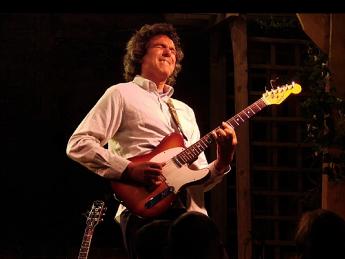Search
Rychard Carrington reports on John Etheridge's Zappatistas – Cambridge Modern Jazz Club,The Junction, Cambridge 26 February 2009

Frank Zappa, whose distinctive moustachioed face presided over the evening via a big portrait hanging over the stage, is a unique character in the history of rock. He was the first intellectual artistic radical to patronise the nascent scene, he had a significant influence on the very concept of avant-garde rock, yet his music was also quite apart from anyone else's. In the late 1960s, when cutting edge rock musicians were essentially pop or blues musicians whose minds had been suddenly expanded/addled by psychedelic drugs, Zappa developed a startling new sound from the influences of modern classical (especially Edgar Varese), free jazz and doo-wop, while playing potent psychedelic electric guitar himself, and singing boldly explicitly satirical lyrics; in those days such fusion was far, far more radical than it has become. Since his death in 1993 his status as a major figure has solidified, yet his records have never sold in large quantities.
Fast forward to 2009, and there is a band playing a whole set of Zappa numbers at The Junction 2. The Zappatistas are a jazz-rock band, many of whose members are well known to the cognoscenti of British jazz-rock. Like many such big fish in this small pond, leader John Etheridge was in - you've guessed it - Soft Machine. Undoubtedly The Zappatistas are a first-rate ensemble who would have produced a good show even if their set hadn't included any Zappa numbers. They allowed themselves freedom to truly flourish, without wandering far the essence of the compositions. From the outset, the brass section distinguished them from Zappa's Mothers Of Invention, saxophonist Theo Travis (on his first date with the band), trumpeter Paul Jayasinha and trombonist Annie Whitehead each contributing excellent solos. Well, the musicians were all good: Rob Statham on bass guitar, Nick France on drums, ‘musical director' Steve Lodder on keyboards and Etheridge on electric guitar. An unaffected frontman, Etheridge delivered vocals only on Let's Make The Water Turn Black, otherwise leading either through masterful guitar, definitely on a par with Zappa's own playing, or else by standing back and allowing the other musicians to flow.
Numbers performed included Peaches En Regalia, Eat That Question, Sleep Dirt, The Grand Wazoo, Harry You're A Beast and Zoot Allures.
Stripped of his distinctive satirical voice, and removed from the times to which he related eloquently and pertinently, Zappa definitely still cuts it as a composer of playful, inventive, sophisticated music. The Zappatistas certainly do him justice, which is no small achievement.
Writer: Rychard Carrington